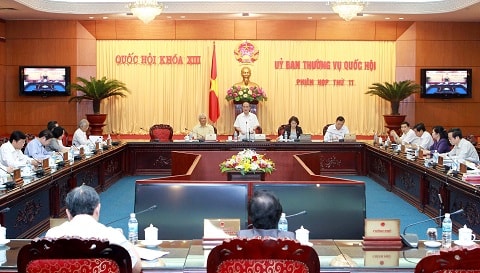The National Assembly Standing Committee discussed the draft Law on Anti-Corruption (amended)
On the afternoon of September 18, the National Assembly Standing Committee discussed the draft Law on Anti-Corruption (amended) submitted by Government Inspector General Huynh Phong Tranh on behalf of the Government.

The 11th session of the National Assembly Standing Committee.
According to the National Assembly's 2012 legislative program, the draft Law on Anti-Corruption (amended) will be passed at the 4th Session taking place in October.
According to the Government's Submission, the shortcomings of the current Law on Anti-Corruption lie in the implementation of publicity and transparency in the activities of agencies, organizations and units; transparency of assets, income, and job position transfers of cadres, civil servants and public employees; responsibilities of heads of agencies, organizations and units; and state management of anti-corruption work.
Not agreeing with the viewpoint of comprehensively amending the Law on Anti-Corruption, many members of the National Assembly Standing Committee said that only important contents should be amended, such as implementing democracy, publicity and transparency in personnel work, especially in the stages of recruitment, planning, appointment, transfer, rotation, evaluation, reward, discipline, etc.; strictly implementing regulations on transparency of assets and income of cadres, civil servants and public employees, publicizing asset and income declarations at workplaces; gradually expanding the scope of declaration and public disclosure of asset and income declaration results; innovating the model and organization, operation of leadership, direction agencies and standing agencies, advising on anti-corruption work, etc.
The reason is that due to the short preparation time, the implementation of the Law on Anti-Corruption has not been fully summarized and evaluated (only a preliminary summary has been made) while the draft revised Law is expected to be passed at only one session.
National Assembly Chairman Nguyen Sinh Hung suggested that, through the preliminary review, existing and feasible issues will be revised first, and unfeasible content that needs further research will be done later.
Disclosure of assets at work
Regarding the regulation on subjects required to declare assets and income, many opinions of the National Assembly Standing Committee agree that the subjects should not be expanded, because the declaration and transparency of assets is still a formality, the effectiveness of corruption prevention is low, so expanding the subjects will not solve many problems.
The Judiciary Committee's review report recommends that the draft should specifically stipulate contents related to declaration and transparency of assets and income such as the competent authority verifying and issuing conclusions; responsibilities of the declarant; scope of use of verification conclusions; accountability mechanism; order, procedures, time, and coordination relationship in verification; complaints and settlement of complaints in declaration and verification...
The submission of the Government, the inspection agency and some members of the National Assembly Standing Committee stated that the declaration of assets and income should only be made public at the individual's workplace to enhance the responsibility for declaration as well as to ensure the legality of assets.
Three options for regulations on the Steering Committee for Anti-Corruption
Based on the Conclusion of the 5th Central Conference of the 11th tenure, the Government proposed 3 options to amend the regulations on the Central Steering Committee on anti-corruption.
According to the first option, the Central Steering Committee on Anti-Corruption under the Politburo, headed by the General Secretary, is responsible for directing, coordinating, inspecting, and urging anti-corruption activities nationwide. The Central Internal Affairs Committee is the standing body of the Central Steering Committee on Anti-Corruption.
According to the second option, it is necessary to stipulate a Steering Committee in the amended Law to ensure consistency in leadership and direction of anti-corruption work. The organization, tasks, powers and operating regulations of the Central Steering Committee on anti-corruption are prescribed by the National Assembly Standing Committee.
The third option defines the Steering Committee as a Party agency, not a state agency, so the amended Law will not regulate the establishment, organization, tasks, powers and operating regulations of this agency.
Examining this content, the Judiciary Committee determined that if following the first option, the legal documents of the National Assembly cannot regulate the organization, operation and functions of Party agencies.
Similarly, option 2 refers to the unprecedented case where the National Assembly Standing Committee regulates the organization, operation, functions and tasks of the Central Steering Committee on anti-corruption headed by the General Secretary.
The examining body expressed its agreement with option 3 because it reflects the spirit of Resolution 4 of the 11th Central Committee and complies with the precedent of building the current legal system. At the same time, it still ensures the leadership of the Party and the management of the State in the work of preventing and combating corruption. The organization and operation of the Steering Committee as stipulated in the Party's documents are appropriate.
Many members of the National Assembly Standing Committee also expressed agreement with option 3.
According to (Chinhphu.vn) - LT






